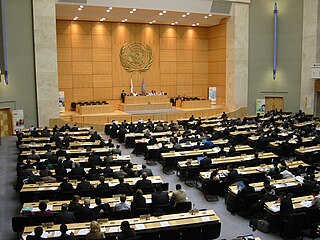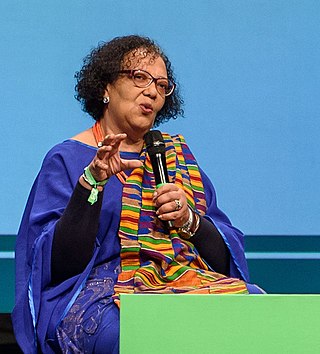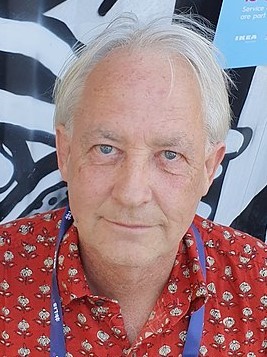
The World Summit on the Information Society (WSIS) was a two-phase United Nations-sponsored summit on information, communication and, in broad terms, the information society that took place in 2003 in Geneva and in 2005 in Tunis. WSIS Forums have taken place periodically since then. One of the Summit's chief aims is to bridge the global digital divide separating rich countries from poor countries by increasing internet accessibility in the developing world. The conferences established 17 May as World Information Society Day.
The Association for Progressive Communications (APC) is an international network of organizations that was founded in 1990 to provide communication infrastructure, including Internet-based applications, to groups and individuals who work for peace, human rights, protection of the environment, and sustainability. Pioneering the use of ICTs for civil society, especially in developing countries, APC were often the first providers of Internet in their member countries.

The United Nations Information and Communication Technologies Task Force was a multi-stakeholder initiative associated with the United Nations which is "intended to lend a truly global dimension to the multitude of efforts to bridge the global digital divide, foster digital opportunity and thus firmly put ICT at the service of development for all".
Technology governance means the governance, i.e., the steering between the different sectors—state, business, and NGOs—of the development of technology. It is the idea of governance within technology and its use, as well as the practices behind them. The concept is based on the notion of innovation and of techno-economic paradigm shifts according to the theories by scholars such as Joseph A. Schumpeter, Christopher Freeman, and Carlota Perez.

'Gbenga Sesan is a social entrepreneur who delivers Information and communications technology to the under served. He has had a career in the application of Information and Communication Technologies for Development (ICT4D) – for individuals, institutions, nation-states, regional entities and the international community.

Digital rights are those human rights and legal rights that allow individuals to access, use, create, and publish digital media or to access and use computers, other electronic devices, and telecommunications networks. The concept is particularly related to the protection and realization of existing rights, such as the right to privacy and freedom of expression, in the context of digital technologies, especially the Internet. The laws of several countries recognize a right to Internet access.

Internet governance consists of a system of laws, rules, policies and practices that dictate how its board members manage and oversee the affairs of any internet related-regulatory body. This article describes how the Internet was and is currently governed, some inherent controversies, and ongoing debates regarding how and why the Internet should or should not be governed in future.

The Internet Governance Forum (IGF) is a multistakeholder governance group for policy dialogue on issues of Internet governance. It brings together all stakeholders in the Internet governance debate, whether they represent governments, the private sector or civil society, including the technical and academic community, on an equal basis and through an open and inclusive process. The establishment of the IGF was formally announced by the United Nations Secretary-General in July 2006. It was first convened in October–November 2006 and has held an annual meeting since then.
Women'sNet is a networking support programme designed to enable South African women to use the internet to find the people, issues, resources and tools needed for women's social action.

Ungana-Afrika, Swahili for "connect africa", is a non-governmental organisation based in Pretoria, South Africa that provides a wide range of ICT services for civil society within and outside of Africa. It aims to better empower civil society organisations, networks and related stakeholders, in terms of ICT capacity and resources, so they may more efficiently achieve their unique social missions.

Laura DeNardis is an American author and a scholar of Internet governance and technical infrastructure. She is the Professor and Endowed Chair in Technology, Ethics, and Society at Georgetown University. DeNardis is an affiliated Fellow of the Yale Information Society Project at Yale Law School and served as its Executive Director from 2008-2011. She previously served as a Senior Fellow of the Centre for International Governance Innovation (CIGI) and the Director of Research for the Global Commission on Internet Governance. With a background in information technology engineering and a doctorate in Science and Technology Studies (STS), her research studies the social and political implications of Internet technical architecture and governance. Domestically, she served as an appointed member of the U.S. Department of State Advisory Committee on International Communications and Information Policy (ACICIP) during the Obama Administration. She has more than two decades of experience as an expert consultant in Internet Governance to Fortune 500 companies, foundations, and government agencies.
Multistakeholder governance is a practice of governance that employs bringing multiple stakeholders together to participate in dialogue, decision making, and implementation of responses to jointly perceived problems. The principle behind such a structure is that if enough input is provided by multiple types of actors involved in a question, the eventual consensual decision gains more legitimacy, and can be more effectively implemented than a traditional state-based response. While the evolution of multistakeholder governance is occurring principally at the international level, public-private partnerships (PPPs) are domestic analogues.

Fatimata Seye Sylla is the director of Senegal's Digital Freedom Initiative, a council member for the Free and Open Source Software Foundation for Africa, and the Senegal National Coordinator of the African Civil Society for the Information Society. She is a former member of the At-Large Advisory Committee for ICANN, where she represented Senegal, and advocated there for greater involvement of the developing world with Internet governance. She also served on the board of the CATIA initiative, a program that worked to support ICT initiatives and their directors across African countries.

Dorothy K. Gordon is a Ghanaian technology activist and development specialist. She was the founding director general of the Ghana-India Kofi Annan Centre of Excellence in ICT (AITI-KACE). She left AITI-KACE in 2016. She is former board member of Creative Commons and currently serves on its advisory council. She also serves on the board of Linux Professional Institute

Jennifer Radloff is a South African feminist activist and a pioneer on Information and communications technology (ICT) for social justice. She works for the Association for Progressive Communications (APC) in the Women's Rights Programme and is a board member of Women's Net.
Multistakeholder participation is a specific governance approach whereby relevant stakeholders participate in the collective shaping of evolutions and uses of the Internet.

Mike Jensen is a South African ICT expert who was inducted into the Internet Hall of Fame as a "Global Connector" in 2017. He is particularly known for his work to build networks connecting the non-profit sector and for assisting developing countries to establish network connectivity.
The African Internet Governance Forum (AfIGF) is a multistakeholder forum that facilitates dialogue on Internet governance issues. It is one of the 19 regional IGF initiatives and aims to address and discuss the issues of all 54 nations in Africa.
South Eastern European Dialogue on Internet Governance (SEEDIG) is an officially recognized subregional multistakeholder Internet Governance Forum on Internet and digital policy issues. This subregional IGF National and Regional Initiative (NRI) is of particular relevance for South East Europe and its neighbours. SEEDIG has been founded in 2014 and is structured as an open and informal space for different stakeholders to discuss Internet-related issues. Annual forums are held in different parts of the region. The first annual forum was held in June 2015 in Sofia, Bulgaria.
Valeria Betancourt is an Ecuadorian sociologist, human rights defender and pioneer in the use of information and communication technologies (ICT) to promote the development and empowerment of citizens in Latin America and globally.











